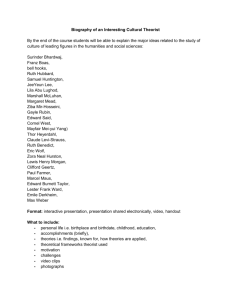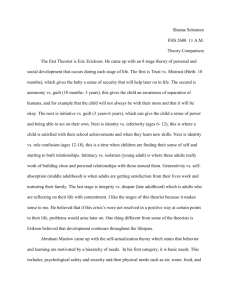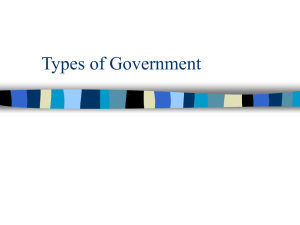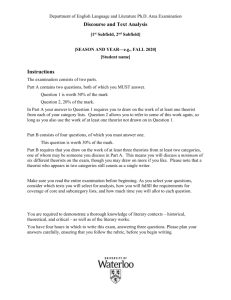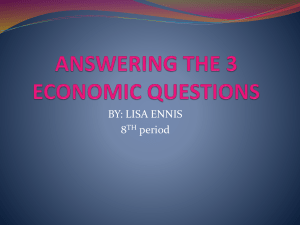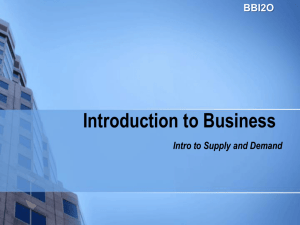File - Mr. James
advertisement
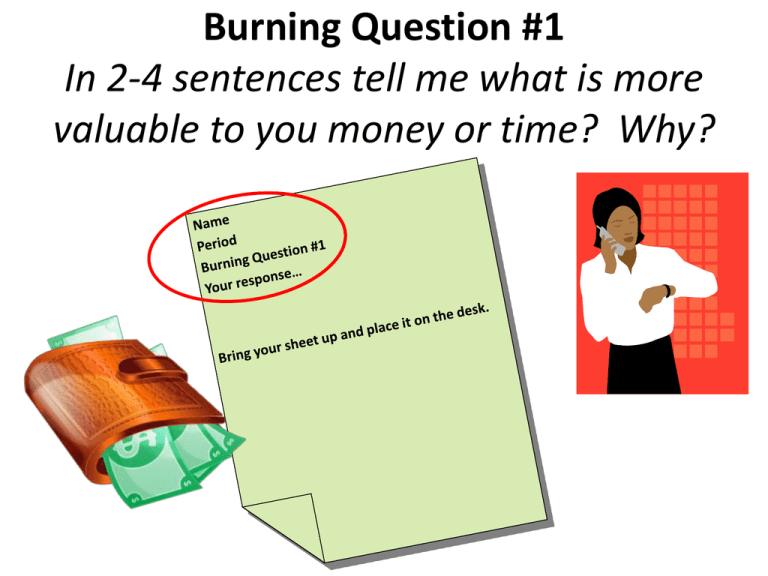
Burning Question #1 In 2-4 sentences tell me what is more valuable to you money or time? Why? What is Economics? Economics- the study of how individuals, families, businesses and societies use their limited resources to fulfill their unlimited wants. Two Parts 1. Macroeconomics- deals with the economy as a whole and decision making by large units such as governments. (All the trees in the forest) 2. Microeconomics- deals with behavior and decision making by small units such as individuals and firms. (A specific tree in the forest) Everyone Must Choose Economics- the study of how individuals, families, businesses and societies use their limited resources to fulfill their unlimited wants. So What’s The CostTime, Money??? Opportunity Cost- The value of the next best alternative that had to be given up to do the action that was chosen. Why Choose? Wants vs Needs Scarcity- people do not and cannot have enough income or time to fulfill their every want. Trade-offs- Exchanging one thing for another. “I wanted a iPad3, however elected for the Kindle Fire after seeing the price.” “I choose to go to the movies rather than study for my economics exam.” “I choose to eat at home rather than eat out.” Check for Understanding ___________ = the study of how individuals, families, businesses and societies use their limited resources to fulfill their unlimited wants. ___________ = deals with behavior and decision making by small units such as individuals and firms. ___________ = people do not and cannot have enough income or time to fulfill their every want. ___________ = The value of the next best alternative that had to be given up to do the action that was chosen. Scarce Resources Influences Production 5 factors of production 1. Land- Refers to natural resources that exist without human intervention. 2. Labor- The work people do to produce goods & services is a resource. -Good= tangible items people can buy (medicine, clothing, and computers) -Service= activities done for a fee. (maids, cooks, hairstylists etc…) 5 factors of production 3. Capital- Manufactured goods used to make other goods. Buildings, trucks, factories etc… -Increases productivity *PHYSICAL & HUMAN 4.Entrepreneurial Talent- Usefulness of individuals to START new facilities and BUILD new products and processes and IMPROVE management techniques. (involves a willingness to take risks in order to reap profits) 5 factors of production 5. Technology- Includes the use of land, labor or Capital to produce goods & services more efficiently. Matching??? ____ Includes the use of land, labor or Capital to produce goods & services more efficiently. ____ Manufactured goods used to make other goods. Buildings, trucks, factories etc… ____ Refers to natural resources that exist without human intervention. ____ Usefulness of individuals to start new facilities and build new products and processes and improve management techniques. ____ The work people do to produce goods & services is a resource. A- Land B- Labor C- Capital D- Entrepreneurial Talent E- Technology How Did You Fare? E___ Includes the use of land, labor or Capital to produce goods & services more efficiently. C___ Manufactured goods used to make other goods. Buildings, trucks, factories etc… A___ Refers to natural resources that exist without human intervention. E___ Usefulness of individuals to start new facilities and build new products and processes and improve management techniques. B___ The work people do to produce goods & services is a resource. A- Land B- Labor C- Capital D- Entrepreneurial Talent E- Technology Win Lose or Draw 5 Factors of Production “FOP” and “PPC” Take out your books and turn to page 10. We will be reading aloud FOP “effect on income and wealth.” Take out your books and turn to page 17. We will be reading aloud “production possibilities curves” Textbook page 18 Answer question 4 on page 19 The 3 Basic Economic Questions All economic systems that have ever existed or will ever exist have to answer some basic questions. Let's explore the questions and some answers. The 3 Essential Economic Questions 1 - What goods and services will be produced? 2 - How will the goods and services be produced? 3 – Who will get the goods and services? 15 Basic Economic Questions Throughout history different countries have used different organizing methods to answer the basic economic questions. Focusing on the market system… Some of the main characteristics of a market system are Private property Freedom of enterprise and choice Self-interest Competition markets and prices Tech and capital Specialization Use of money of resources Active, but limited, gov 16 1) What will be produced? The answer to the first question is that we let the supply and demand of the market determine what and how much to produce. Goods that consumers are both willing and able to buy, and producers are willing and able to make, get made in the amount that both working together see fit. Note consumers “vote” for goods to be made with their dollars and the goods are likely to be made if firms can make profit. 17 2) How? The answer to the second question is producers will use the least cost combination of inputs to produce a given level of output. The reason for this is twofold. 1. First, by using the least cost methods more profit will be earned by the producer. Producers certainly like to make profit. 2. But, the second reason is that if a producer does not use least cost methods of production, when other producers do, the high cost producer may not be able to compete with the other low cost producers and will eventually go out of business. 18 Resource use Say there are three ways of making a good from a technical point of view. Here we list the number of units of each resource needed to make a good: Resource technique 1 technique 2 technique 3 Land 4 2 1 Labor 1 3 4 Capital ET 1 1 1 1 2 19 Resource use Next what each resource costs per unit and we can then see how much it costs to make the units under each technique. For now, let’s just say we look to the market to find what it costs to get each unit of each resource. Here technique 2 would be used! Resource Land technique 1 technique 2 technique 3 $2 4 ($8) 2 ($4) 1 ($2) Labor $1 1 ($1) 3 ($3) 4 ($4) Capital $3 Entrepreneurial $3 ability Total Cost 1 ($3) 1 ($3) 1 ($3) 1 ($3) 2 ($6) 1 ($3) $15 $13 $15 20 3) For Whom? The answer to the third question is those who are willing and able to pay for the items made. We become able to pay by giving up something that is valuable to us - labor or other assets. 21 Economic Systems 3 Types of Economic Systems 1. Traditional Economy- 3rd World Countries Ex-Aborigine peoples of Australia 2. Command Economy- Communist countries Ex- Former Soviet Union or China 3. Market Economy- Developing nations Ex- India 4. Mixed Market Economy- Developed nations Ex- US & Great Brittan, Canada 23 Economic Systems Types of Economic Systems 1. Traditional EconomyUsually tribal or family led. The leaders make the rules and everyone else follows & shares benefits. 24 Economic Systems Types of Economic Systems 2. Command EconomyThe government controls all the factors of production and dictates how the nation answers the 3 economic questions. 25 Economic Systems Types of Economic Systems 3. Market EconomyThe people control the factors of production and determine independently how we answer the 3 economic questions. Adam Smith- Pure Capitalism- Lazzie Faire 26 Economic Systems Types of Economic Systems 4. Mixed- Market EconomyThe people control the factors of production however the people & the government determine how to answer the 3 economic questions. 27 Traditional Economy Pro- Easy to follow. Everyone has a well defined role to follow Leaders People Consumers Con- Very difficult to change Command Economy Pro- Few people are left out. Less poverty. Government Business People Consumers Con- Ingenuity is stifled. Lack of worker incentive. Market Economy “Pure Capitalism” Pro- People have more say & own factors of production Business Government Con- Many will struggle People Consumers Mixed Market Economy Pro- People & the government have more say & BOTH own factors of production Business Government People Consumers Con- Some people will struggle. Economic Theory The Big 3 1. Adam Smith 2. Karl Marx 3. John Maynard Keynes Economic Theorist: Adam Smith is to Market Economy Wrote “Wealth of Nations” is the Father of Modern Economics Economic Theorist: Adam Smith Courtesy of Wikipedia Economic Theorist: Karl Marx is to Command Economy Wrote “Communist Manifesto” is the Founder of Marxism aka- communism Economic Theorist: Karl Marx Courtesy of Wikipedia Economic Theorist: Keynes is to Mixed Market Economy is to End of Great Depression is to Father of Modern Economics Economic Theorist: Keynes Courtesy of Wikipedia

